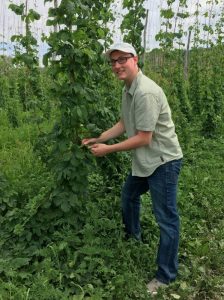This post was written by Daniel Handler ’18

Daniel Handler ’18 at a local Hopyard
New York State was once known as the most important producer of hops, the plant that is used to flavor beer by affecting its bitterness. By the mid19th century, New York State had achieved national leadership in hops production, containing over 40,000 acres of hopyards. The bulk of this production occurred in only several Central New York counties, including Madison, Otsego, Oneida, and Schoharie Counties. These counties produced millions of pounds of hops for both domestic and international markets, and created a culture of hop growing in Central New York. However, by the early 20th century the New York State hops industry was all but destroyed. Several hard-hitting pest and disease outbreaks in the beginning of the 20th century caused hop production values to rapidly decline. Combined with an increase in competition with new hop growers in the Pacific Northwest and the enactment of Prohibition, the New York State hops industry was unable to recover, and almost completely disappeared.
Starting in the early 2000’s however, there has been a growing movement to start producing New
York State hops once again. This renewal of the hops industry in New York is mostly due to
consumer demand for craft and specialty beers. This demand has caused the creation of many
new breweries, microbreweries, and homebrewers, all of which are seeking local ingredients to
put into their beer. This new demand for locally grown hops has created a trend of increasing
hopyard acreage in New York. To promote this trend, the Madison County Cornell Cooperative
Extension Hops Program was created. The purpose of this Program is to provide support to new
and experienced hops growers through web resources, field meetings, newsletters, scouting
reports, individual consultations, and conferences. This support greatly benefits local hops
growers and potential hops growers by teaching them what it takes to successfully grow and
make a profit with hops. Without the knowledge that the Hops Program offers, it would be much
more likely for many hops growers to become unsuccessful in creating and maintaining their hop
production.
Inline with the educational purpose of the Hops Program, my two projects as a Summer Field
School Fellow are to create an annotated bibliography of hops production related resources, and
to analyze data from a recent New York State hop growers survey. These two projects are
important to the Hops Program since both will, on completion, supply necessary knowledge and
information needed by hops growers. The annotated bibliography will be utilized as an online
resource which can be used by growers and potential growers to improve their knowledge of all
aspects of hops production. The data from the growers survey, once analyzed and interpreted,
will be used to create a report on the state of the New York hop industry at this time.
Successfully completing these projects, as much and as well as I can, before ending my time as a
Field School Fellow has become one of my own personal goals as a Fellow. After working for
the Hops Program for several weeks, I realized how thriving the hop growing community is, and
how their success could lead to the success of the rest of the local community. I saw that my
projects were going to be greatly useful to the hop growing community, and am grateful that I
was given this opportunity to provide a service for these people.

